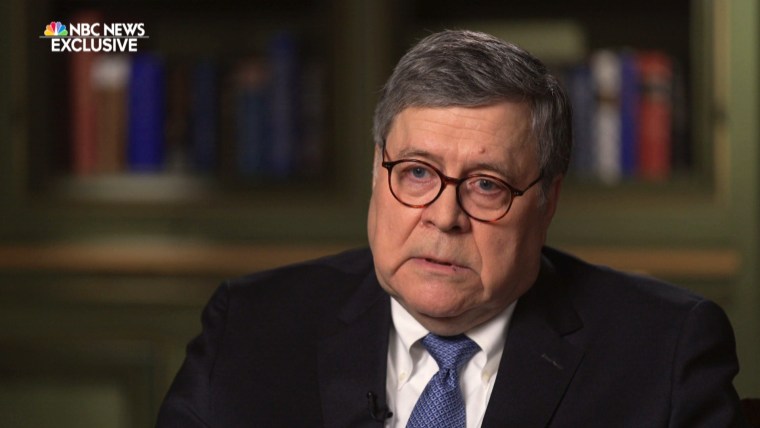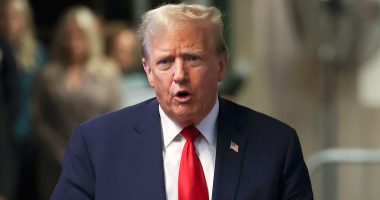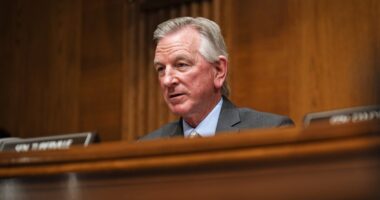The court filing looks simple enough: The House committee investigating the Jan. 6 insurrection wants to see certain records and is asking a judge to order them released.
But the judge isn’t the only one the committee is trying to persuade. Another audience — perhaps the more consequential one — may be the nation’s top prosecutor, Attorney General Merrick Garland.
The 221-page legal brief filed by the committee on Wednesday presents a vivid narrative about Jan. 6 and reaches a stark conclusion: In trying to overturn the 2020 election and stay in office, former President Donald Trump and others “may have engaged in criminal and/or fraudulent acts.”
The Jan. 6 committee has no power to charge anyone with a crime. That authority rests with Garland’s Justice Department, whose focus thus far has largely been the rioters who overran the Capitol that day and not the organizers of Trump’s rally that drew many of them to Washington, D.C. In laying out its findings, the committee appears to be amping up pressure on Garland to investigate Trump and his associates. And it has given Garland a tip sheet of sorts, complete with witnesses to interview, documents to read and legal arguments to make.
Democrats’ impatience with Garland has been growing. Some lawmakers have voiced frustration that Garland doesn’t seem to be targeting those who plotted to keep Biden from taking the office he had rightfully won.
Asked in a recent interview if the committee’s probe might interfere with the Justice Department’s investigation, Rep. Adam Schiff, D- Calif., began to laugh. “I honestly wish we had more concern about that,” Schiff, a member of the Jan. 6 committee, told NBC News. “Because it would mean the Department of Justice was looking at a broader range of potential violations of law than I have any indication may be happening.”
A striking aspect of the committee’s filing is the abundance of detail. Included are pages of emails and depositions given by Trump associates and former government officials — more specifics about Jan. 6 than may have been necessary to convince the California court to grant the committee’s request for records, Stephen Gillers, a professor of legal ethics at New York University School of Law, told NBC News.
One motivation behind the committee’s kitchen sink approach may have been to sway public opinion and impress upon Garland that the evidence gathered is too compelling to ignore.
“It’s quite clear that the committee put in more evidence of the crime-fraud exception than it needed to get” the records, Gillers said. “Likely, in the back of the committee’s mind was the public disclosure of all this additional information. And that, in turn, does have an effect on Garland.”
A former Democratic White House lawyer, speaking on condition of anonymity so as not to offend Garland, also said the legal brief served a dual purpose. “The first goal was to do that [obtain the records]. And, it has the benefit of also putting pressure on Garland.” (In a speech in January, Garland said that his department will hold “all January 6th perpetrators, at any level, accountable under law.”)
Snippets of testimony from former Trump Justice Department officials show that they told him in December 2020 that there wasn’t voter fraud on a scale that would overturn the results. “The president nevertheless continued to insist falsely through January that he had ‘won the election in a landslide,’” the brief reads.
In one instance, Richard Donoghue, a senior Justice Department official, spoke to Trump about a videotape supposedly showing ballots packed into a suitcase at a Georgia polling place. “The president kept fixating on this suitcase that supposedly had fraudulent ballots and that the suitcase was rolled out from under the table,” Donoghue told the committee. “And I said, ‘No, sir. There is no suitcase. You can watch the video over and over; there is no suitcase.’”
At issue in Wednesday’s legal brief is the committee’s effort to obtain emails and other material from John Eastman, a conservative attorney whom the committee wrote “purports to have been the former president’s lawyer” as Trump tried to cling to his job.
Eastman invoked the attorney-client privilege as one reason for not turning over the records. In response, the committee argued that the privilege does not apply and that the documents should be released because of a legal principle known as the “crime-fraud” exception. What that means, the committee wrote, is attorney records can’t be withheld if a client uses the legal advice he’s getting to carry out a crime or fraud.
In the brief, the committee asked the judge to review the documents in private to decide whether the crime-fraud exception applies. To make the case, the committee laid out evidence that shows, it said, “a good-faith basis for concluding” that Trump and some of his allies potentially defrauded the nation by making false claims of a corrupt election, pressuring state officials to change election results, and interfering with the election’s certification.
In a statement Friday, Trump denounced the committee’s work. “The actual conspiracy to defraud the United States was the Democrats rigging the Election and the Fake News Media and the Unselect Committee covering it up,” he said. “Few things could be more fraudulent, or met with more irregularities, than the Presidential Election of 2020.”
Eastman’s attorney, Charles Burnham, said in a statement: “Like all attorneys Dr. John Eastman has a responsibility to protect client confidences, even at great personal risk and expense. The Select Committee has responded to Dr. Eastman’s efforts to discharge this responsibility by accusing him of criminal activity. Because this is a civil matter, Dr. Eastman will not have the benefit of the Constitutional protections normally afforded to those accused by their government of criminal conduct. Nonetheless, we look forward to responding in due course.”
More than any single document made public so far by the committee, the filing illuminates the breadth of the panel’s work. Most of the probe has happened behind closed doors, though the panel plans to hold public hearings this spring. Denver Riggleman, a former Republican congressman from Virginia who is now working on the committee’s staff, hinted at the committee’s findings in a speech last weekend before a largely anti-Trump audience. He said that he sees “the data for Jan. 6 and I wish I could tell you about it, because if I did, you would be more shocked than you can imagine.”
The committee’s nine members are looking into all aspects of Jan. 6, including the efforts made by Trump and his allies to sow doubts about the election results and encourage states to submit electors loyal to Trump. A criticism the committee has faced is that it can’t be impartial. Seven of its members are Democrats and the two Republicans, Liz Cheney, of Wyoming, and Adam Kingzinger, of Illinois, are among Trump’s staunchest detractors.
The filing offers a chance to get an independent party — the judge in the case — to validate the committee’s finding of possible wrongdoing. If the judge were to hold that the crime-fraud exception indeed applies, that would buttress the case that Garland needs to act.
“That decision could double down on the pressure on Garland,” Gillers added. “Because then it’s not just the committee; it’s a judge.”
Of course, the opposite also holds true. If the judge rejects the argument and sees no basis for a criminal case, the committee could see its credibility seriously tarnished ahead of the public hearings. In that sense, the filing represents a bit of a gamble.
“I wish there were more Republicans” on the committee, Alberto Gonzales, who was attorney general during George W. Bush’s presidency, told NBC News. “It would give greater heft to the conclusions of the committee. But, we are where we are.”
Source: | This article originally belongs to Nbcnews.com











